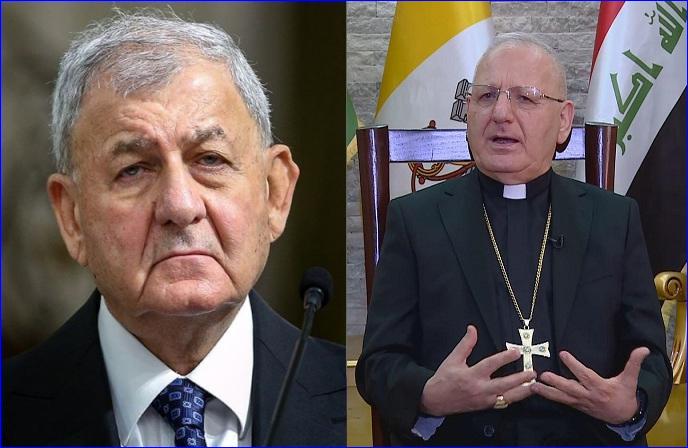On July 12 Iraqi president Abdul Latif Rashid repealed the decree recognizing the appointment of Cardinal Louis Raphael Sako as head of the Chaldean Catholic Church and which appointed him to the office of the waqf (وقف), the endowment which oversees all church property. The details of the events leading up to this action are exhaustively covered in this report by MEMRI. In brief, a political feud between the Patriarch and an Assyrian secular leader, Rayan Al-Kildani, who is part of the same political group as the president, escalated to the top levels of the Iraqi government.
The office of the waqf is an institution dating back to the 7th century AD and is a product of Islamic law. There are three offices of the waqf, one for Sunnis, one for Shiites and one for all other non-Muslim minorities combined, primarily Christians, Yazidis and Mandeans. The head of the waqf for non-Muslims has traditionally been a Christian, this based on Christians being the third largest religious group in Iraq, behind Shiites and Sunnis. This is by tradition, however, and the head of that office need not be a religious figure or even a Christian, and can even be a Muslim.
Historically, the head of the office was appointed by the Muslim state. In recent times, the “secular” state has assumed that role.
This punitive action by president Rashid against Patriarch Sako not only puts the property of the church in danger of being confiscated by unscrupulous actors, but reinforces the status of non-Muslim minorities as religious groups and Dhimmis under Islamic law.
In 2005 Iraq passed a constitution which officially recognized non-Arab and non-Muslim groups as ethnic groups instead of religious groups. This included Assyrians (also known as Chaldeans and Syriacs), Yazidis, Mandeans, Turkmen and Shabaks. This same constitution also a recognized Islamic law as a source of law (as opposed to the source of law).
Islamic law recognizes only Christians, Jews and Zoroastrians, and makes provisions for these three groups, known as Dhimmis. Dhimmis do not serve in Muslim armies, but are taxed in lieu of that (the jizya); they are also offered some protection for their faith, though in practice this has always been lacking. There are a host of restrictive and humiliating rules which Dhimmis must live by.
Even though Iraq is a constitutionally secular state in theory, in practice it is not so. There are numerous Islamic rules, regulations and offices in existence, the waqf being one of them. For example, Islamic rules apply without exception to inter-religious marriages, with children forcefully Islamized despite the wishes of the parents.
The action of president Rashid against Patriarch Sako, though arising in a secular context, is never-the-less rooted in Islamic law. The Patriarch and his Christian community were punished as a religious group, a Dhimmi group, despite what the Iraqi constitution legally proclaims. There is no legal basis for this action in the Iraq constitution. This action is extra-constitutional and rooted in Islamic Sharia law.
Because the waqf is based on Islamic law it should be abolished at least for non-Muslim groups, which should not have to live under Islamic law. If Iraq proclaims to be a constitutionally secular state then it must not use Muslim laws when dealing with non-Muslim groups.
Patriarch Sako is the de-facto custodian of the property of the Chaldean church, as are all other leaders of religious groups custodians of their properties. The government has no authority to grant him that right, because it is not theirs to do so. Doing so only reinforces the Dhimmi status of Christians.
AINA calls on the Iraqi government to abolish the office of the waqf. AINA calls on Patriarch Sako to resign from the office and disavow it as a vestige of Islamic law which should not be used against non-Muslims groups.
By:aina.org






